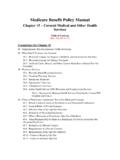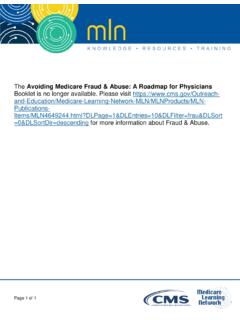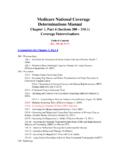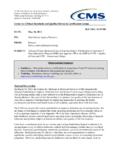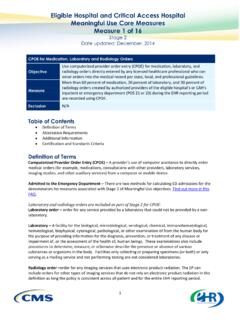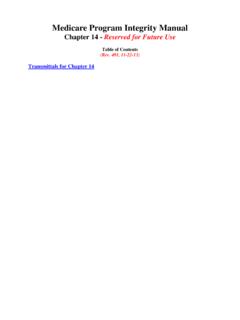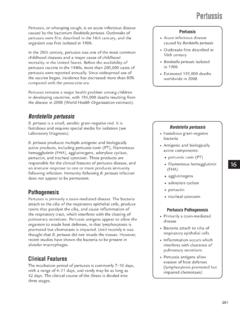Transcription of CMS Manual System
1 Department of Health &. CMS Manual System Human Services (DHHS). Pub. 100-02 Medicare Benefit Policy Centers for Medicare &. Medicaid Services (CMS). Transmittal 10 Date: MAY 7, 2004. CHANGE REQUEST 3298. I. SUMMARY OF CHANGES: Adding information from Transmittal 761, published September 2000, also found in sections and of the Hospital Manual , to Chapter 6, sections and of the on-line Medicare Beneficiary Manual , that had been accidentally left out during the transition from paper based manuals to on-line manuals. MANUALIZATION EFFECTIVE/IMPLEMENTATION DATE: N/A. Disclaimer for Manual changes only: The revision date and transmittal number apply only to the red italicized material. Any other material was previously published and remains unchanged. However, if this revision contains a table of contents, you will only receive the new/revised information, and not the entire table of contents.
2 II. CHANGES IN Manual INSTRUCTIONS: (R = REVISED, N = NEW, D = DELETED). R/N/D CHAPTER/SECTION/SUBSECTION/TITLE. R 6 R 6 Hospitalization Services *III. FUNDING: These instructions should be implemented within your current operating budget. IV. ATTACHMENTS: Business Requirements X Manual Instruction Confidential Requirements One-Time Notification Recurring Update Notification *Medicare contractors only - General (Rev. 10, 05-07-04). , There is a wide range of services and programs that a hospital may provide to its outpatients who need psychiatric care, ranging from a few individual services to comprehensive, full-day programs; from intensive treatment programs to those that provide primarily supportive. In general, to be covered the services must be: Incident to a physician's service (see ); and Reasonable and necessary for the diagnosis or treatment of the patient's condition.
3 This means the services must be for the purpose of diagnostic study or the services must reasonably be expected to improve the patient's condition. A. Coverage services must meet the following criteria: 1. Individualized Treatment must be prescribed by a physician and provided under an individualized written plan of treatment established by a physician after any needed consultation with appropriate staff members. The plan must state the type, amount, frequency, and duration of the services to be furnished and indicate the diagnoses and anticipated goals. (A plan is not required if only a few brief services are furnished.). 2. Physician Supervision and must be supervised and periodically evaluated by a physician to determine the extent to which treatment goals are being realized.
4 The evaluation must be based on periodic consultation and conference with therapists and staff, review of medical records, and patient interviews. Physician entries in medical records must support this involvement. The physician must also provide supervision and direction to any therapist involved in the patient's treatment and see the patient periodically to evaluate the course of treatment and to determine the extent to which treatment goals are being realized and whether changes in direction or emphasis are needed. 3. Reasonable Expectation of must be for the purpose of diagnostic study or reasonably be expected to improve the patient's condition. The treatment must, at a minimum, be designed to reduce or control the patient's psychiatric symptoms so as to prevent relapse or hospitalization, and improve or maintain the patient's level of functioning.
5 It is not necessary that a course of therapy have as its goal restoration of the patient to the level of functioning exhibited prior to the onset of the illness, although this may be appropriate for some patients. For many other psychiatric patients, particularly those with long-term, chronic conditions, control of symptoms and maintenance of a functional level to avoid further deterioration or hospitalization is an acceptable expectation of improvement. "Improvement" in this context is measured by comparing the effect of continuing treatment versus discontinuing it. Where there is a reasonable expectation that if treatment services were withdrawn the patient's condition would deteriorate, relapse further, or require hospitalization, this criterion is met. Some patients may undergo a course of treatment that increases their level of functioning, but then reach a point where further significant increase is not expected.
6 Such claims are not automatically considered noncovered because conditions have stabilized, or because treatment is now primarily for the purpose of maintaining present level of functioning. Rather, coverage depends on whether the criteria discussed above are met. Services are noncovered only where the evidence clearly establishes that the criteria are not met; for example, that stability can be maintained without further treatment or with less intensive treatment. B Partial hospitalization is a distinct and organized intensive treatment program for patients who would otherwise require inpatient psychiatric care. See for specific program requirements. C. Application of following discussion illustrates the application of the above guidelines to the more common modalities and procedures used in the treatment of psychiatric patients and some factors that are considered in determining whether the coverage criteria are met.
7 1. Covered generally covered for the treatment of psychiatric patients are: Individual and group therapy with physicians, psychologists, or other mental health professionals authorized by the State. Occupational therapy services are covered if they require the skills of a qualified occupational therapist and be performed by or under the supervision of a qualified occupational therapist or by an occupational therapy assistant. Services of social workers, trained psychiatric nurses, and other staff trained to work with psychiatric patients. Drugs and biologicals furnished to outpatients for therapeutic purposes, but only if they are of a type which cannot be self- administered. Activity therapies but only those that are individualized and essential for the treatment of the patient's condition.
8 The treatment plan must clearly justify the need for each particular therapy utilized and explain how it fits into the patient's treatment. Family counseling services. Counseling services with members of the household are covered only where the primary purpose of such counseling is the treatment of the patient's condition. Patient education programs, but only where the educational activities are closely related to the care and treatment of the patient. Diagnostic services for the purpose of diagnosing those individuals for whom an extended or direct observation is necessary to determine functioning and interactions, to identify problem areas, and to formulate a treatment plan. 2. Noncovered following are generally not covered except as indicated: Meals and transportation . Activity therapies, group activities or other services and programs which are primarily recreational or diversional in nature.
9 Outpatient psychiatric day treatment programs that consist entirely of activity therapies are not covered. "Geriatric day care" programs are available in both medical and nonmedical settings. They provide social and recreational activities to older individuals who need some supervision during the day while other family members are away from home. Such programs are not covered since they are not considered reasonable and necessary for a diagnosed psychiatric disorder, nor do such programs routinely have physician involvement. 3. Psychosocial programs. These are generally community support groups in nonmedical settings for chronically mentally ill persons for the purpose of social interaction. Outpatient programs may include some psychosocial components; and to the extent these components are not primarily for social or recreational purposes, they are covered.
10 However, if an individual's outpatient hospital program consists entirely of psychosocial activities, it is not covered. Vocational training. While occupational therapy may include vocational and prevocational assessment and training, when the services are related solely to specific employment opportunities, work skills or work settings, they are not covered. 4. Frequency and Duration of are no specific limits on the length of time that services may be covered. There are many factors that affect the outcome of treatment; among them are the nature of the illness, prior history, the goals of treatment, and the patient's response. As long as the evidence shows that the patient continues to show improvement in accordance with his/her individualized treatment plan, and the frequency of services is within accepted norms of medical practice, coverage may be continued.
